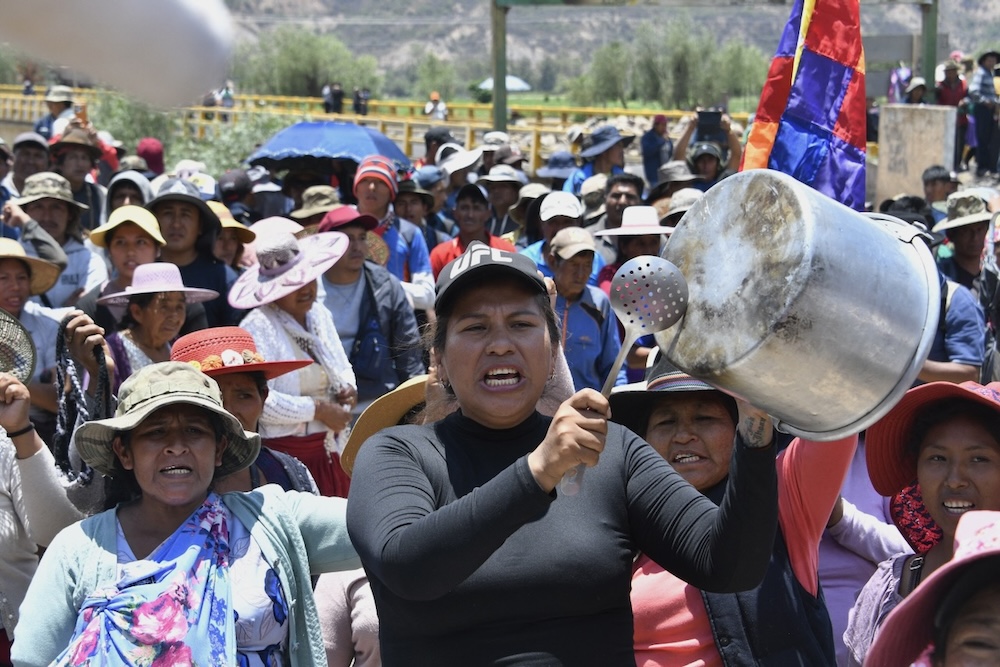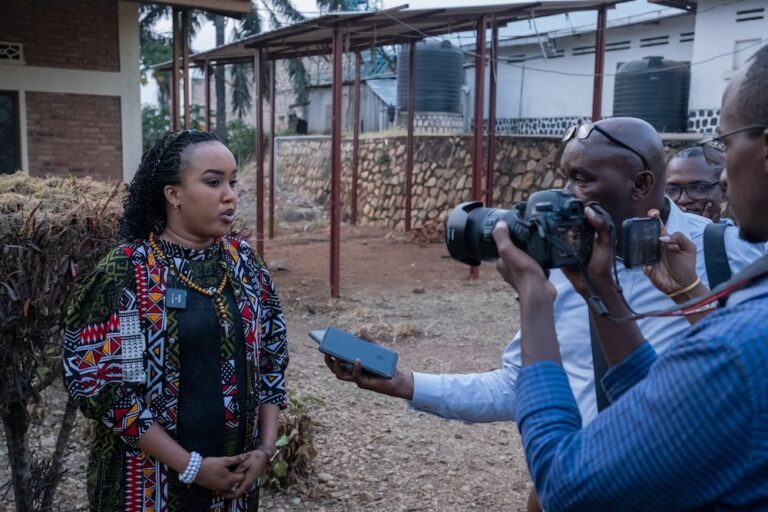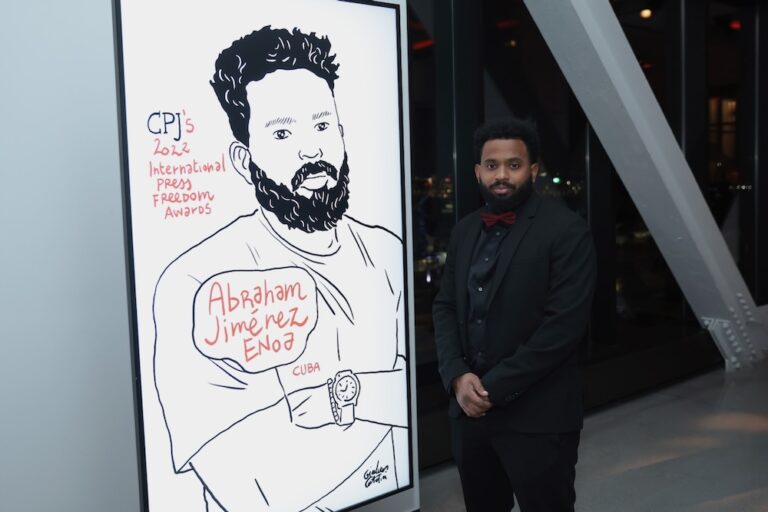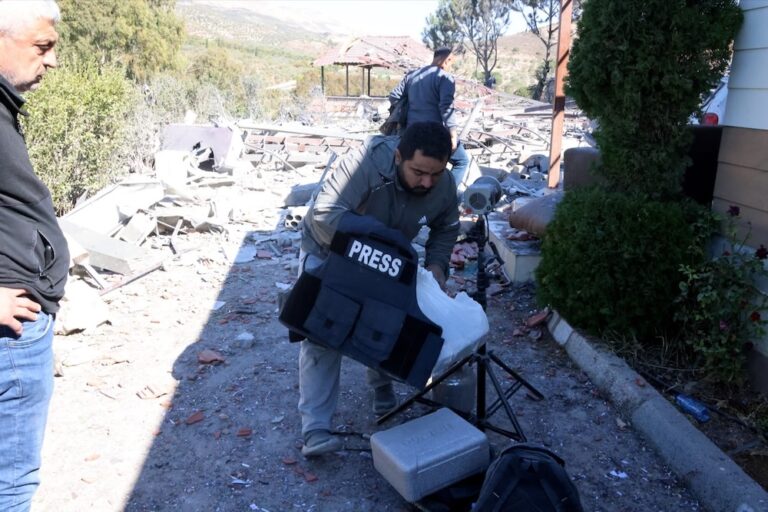November in the Americas: A free expression and civic space round-up produced by IFEX’s Regional Editor Laura Vidal, based on IFEX member reports and news from the region.
November in the Americas saw increasing challenges to freedom of expression and civic space. In the United States, newly approved legislation threatens to undermine civil society and nonprofit organisations. In Bolivia, widespread violence against journalists covering protests highlights the long-term impact of the criminalisation of the press. Meanwhile, Nicaragua’s Universal Periodic Review at the UN Human Rights Council brought renewed calls for the protection of fundamental rights in the country.
Civil society and press freedom under threat
November has been a pivotal month for free expression and civic space in the United States, marked by the outcome of the elections as well as legislative and policy developments that could profoundly impact civil society, press freedom, and global internet governance. Central to this shift was the passage of H.R. 9495 in the House of Representatives. The bill would grant the Secretary of the Treasury the power to revoke the tax-exempt status of nonprofit organisations labeled as “terrorist supporting organisations,” but a lot of questions remain regarding due process or transparency. Advocacy organisations have criticised the bill as a dangerous tool that mirrors authoritarian strategies seen globally. Sarah Yager, Washington director at IFEX member Human Rights Watch, said:
“This legislation threatens the ability of independent groups to engage with the U.S. government on human rights abuses around the world and creates a climate of fear and intimidation. The US Senate should reject this bill.”
Journalists and press advocates are also raising alarms over the potential challenges posed by Donald Trump’s second term. Only two months after the election, Trump “has been waging lawfare” suing media outlets and publishers that have been critical of him. IFEX members like the Committee to Protect Journalists (CPJ) and Reporters Without Borders (RSF) have urged Trump to halt his attacks on the press, highlighting the cascading effects such rhetoric and actions could have on democratic accountability.
The implications for freedom of expression extend beyond U.S. borders in the Americas region. Planned cuts to international aid for independent journalism, fact-checkers, and researchers of disinformation operations could exacerbate challenges in regions like Latin America, and the promises of hard-lined policies against migration could make life harder for exiled journalists seeking refuge, or living in the United States. As authoritarianism rises and democratic institutions falter, these cuts would likely lead to greater deterioration in countries already at risk.
Yet, these threats extend beyond traditional press freedom concerns. According to Iria Puyosa, Senior Research Fellow at the Atlantic Council´s Democracy + Tech Initiative, the Trump administration’s anticipated reduction in international cooperation could derail global efforts to set standards for AI, data privacy, and internet governance. Of particular concern is the intent to revisit Section 230, the legal provision shielding platforms from liability for user-generated content. For Puyosa, Trump’s criticisms of social media companies for alleged bias could lead to regulations forcing platforms to amplify specific content, including conservative narratives on topics such as gun rights, anti-abortion stances, and anti-vaccine rhetoric. This “must carry” approach risks eroding platform accountability and enabling harmful content to proliferate unchecked.
Trump’s second term also threatens to embolden restrictive practices worldwide. The parallels between H.R. 9495 and similar laws in countries like Nicaragua and Venezuela, where governments stifle civil society under the guise of national security, are stark. These measures highlight a troubling trend: leaders with divergent ideologies converging in their methods to suppress dissent.
Bolivia: Escalating violence
Bolivia is experiencing a troubling surge in violence against journalists, a culmination of sustained efforts to delegitimise the press by various political actors. This hostile environment has been exacerbated by anti-government protests led by supporters of former President Evo Morales, resulting in at least 25 journalists being attacked with alarming aggression, including threats, confiscation of equipment, and physical assaults.
Notable incidents include journalist Jurgen Guzmán being nearly strangled with a noose while covering protests near Melga, and photojournalist Jorge Ábrego suffering a heart attack after being caught in a dynamite blast at a roadblock in Parotani, a small town in the center-west of the country. Reporters from various media outlets have faced assaults involving stones, sticks, and explosives, often having their equipment stolen or destroyed by protesters accusing them of being part of the “sold press,” echoing the discourse used by many political actors.
According to Franz Chávez, executive director of IFEX member ANP (Bolivia’s National Association of the Press), this violence is the result of a deliberate campaign to discredit independent journalism. Chávez explained that during Morales’s tenure from 2006 to 2019, the government sought to undermine the credibility of the press, portraying journalists as agents of capitalist interests aligned with the United States. This narrative was reinforced by statements from government officials, as in the case of former Foreign Minister David Choquehuanca’s 2017 declaration labeling the press as an opposition force, which, as Chávez warned at the time, endangered journalists by encouraging confrontation.
The Morales administration also implemented economic measures to weaken independent media. These included mandating the free publication of government notices, disproportionately affecting newspapers while excluding radio and television, leading to significant financial losses and staff reductions. Additionally, independent outlets faced relentless tax audits and fines, and state advertising was allocated as a reward for media adherence to government policies, effectively punishing those that maintained editorial independence. These strategies led to the closure of several outlets, including La Prensa in 2016 and Página Siete in 2023, which cited economic suffocation as the primary cause.
Under President Luis Arce, these oppressive policies have persisted, with continued economic and legal harassment of independent media. The ANP reports that entities responsible for social security contributions and labor regulations are used to investigate and penalise media outlets following unfavorable coverage, indicating a sustained effort to stifle press freedom across administrations.
Bolivia’s ranking of 124th out of 180 countries in RSF’s 2024 World Press Freedom Index reflects the severe challenges facing the country’s media landscape. The escalation of violence against journalists underscores the dangerous consequences of prolonged campaigns to delegitimise the press, resulting in an environment where hostility towards reporters is normalised.
Nicaragua: Advocacy groups call for urgent action
On 13 November, the United Nations Human Rights Council conducted its fourth Universal Periodic Review (UPR) of Nicaragua. This critical review took place against the backdrop of ongoing repression targeting independent media, civil society, and fundamental freedoms. Advocacy groups, including members of IFEX and IFEX-ALC, urged the Council to address Nicaragua’s severe restrictions on freedom of expression, assembly, and association, and to formulate concrete recommendations to ensure the protection and respect of these rights.
Among the issues highlighted were the widespread harassment of journalists, the government’s systematic targeting of independent media, and the suppression of civil society organisations through restrictive laws. Groups emphasised the urgent need for international oversight, pointing to reports from the Office of the High Commissioner for Human Rights and documented complaints by civil society that detail widespread violations.
Advocacy organisations called for specific measures to address the growing climate of fear and control over the country’s information landscape. These include dismantling restrictive legal frameworks and providing protections for journalists and human rights defenders who face constant threats.
During the session, the Working Group approved a draft report containing 279 recommendations focused on human rights from 88 countries, highlighting severe concerns over continued repression of independent media and restrictions on freedom of expression, assembly, and association. Rosalía Bohorquez, Nicaragua’s representative, stated that the country had “taken note” of these recommendations.
The Nicaraguan government is expected to submit its response by the 58th session of the Human Rights Council, scheduled between February and April 2025.
Amplifying initiatives to combat gender-based violence: IFEX members join November 25 campaigns
IFEX members in the Americas participated actively in campaigns linked to 25 November, the International Day for the Elimination of Violence Against Women, sharing impactful publications, initiatives, and data to highlight ongoing challenges and responses to gender-based violence.
In Mexico, ARTICLE 19 Mexico and Central America together with the Rompe el Miedo network monitored protests to ensure incidents would be visible, amplifying the significance of these mobilisations in Mexico and sharing safety advice. Meanwhile, in Colombia, Karisma emphasised the unique barriers women in politics face when denouncing violence, especially in digital spaces, where gender biases can trivialise their experiences and discourage participation in public life. Fundamedios underscored the double risk faced by women journalists in Ecuador, citing over 3,400 reported aggressions since 2007. Derechos Digitales produced vital resources, including helplines for victims of digital gender-based violence in Bolivia, Brazil, and Ecuador, and shared feminist approaches to resisting and transforming digital violence, while FLIP, in Colombia, shared an “Anatomy of digital harassment against journalists”, with a special focus in cases where women journalists were the main target.
In brief
In Ecuador, journalist Leonardo Rivas, news director at a local radio station, was assassinated on November 23 in what is being described as a hit-style killing.
Derechos Digitales released its annual report, People Power Under Pressure, spotlighting the escalating risks faced by human rights defenders across Latin America, including those working on technology and digital rights.
In Venezuela, a new report from Espácio Público has documented 49 arrests and 11 journalists in detention during the post-election period, highlighting intensified repression and censorship.
Guatemalan journalist José Rubén Zamora, founder of elPeriódico, was ordered back to jail after briefly being moved to house arrest. Advocacy groups continue to demand his unconditional release.
A coalition of 24 civil society organisations, including CPJ, released the report Impact of State Censorship Measures on the Right to Freedom of Expression in the Americas. The report, presented during the 190th regular session of the Inter-American Commission on Human Rights (IACHR) in July 2024, examines the growing challenges to press freedom and state censorship across Latin America.
A new report from the Artistic Freedom Initiative examines the severe repression of artists and cultural workers in Nicaragua, highlighting the constraints on creative expression under the Ortega regime.
Costa Rica recently approved a groundbreaking access-to-information (ATI) law, strengthening government transparency and ensuring public access to information. The legislation is seen as a significant step toward accountability in the region.
Radio Ambulante, one of the most influential podcasts in Latin America, is currently seeking pitches from journalists covering the region (including the US) with a focus on in-depth, narrative-driven storytelling.
Human Rights Watch warns of growing attacks on academic freedom in the United States, as universities face increasing pressure to suppress student protests. The report highlights the urgent need to safeguard the right to free expression on campus.



